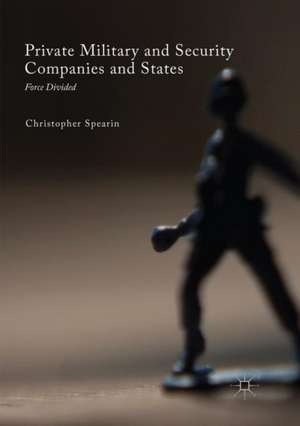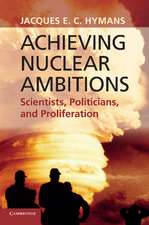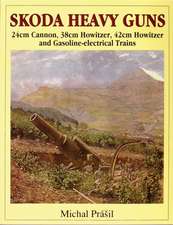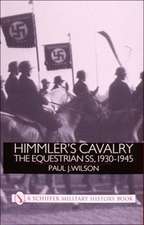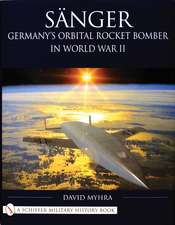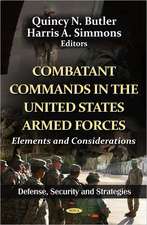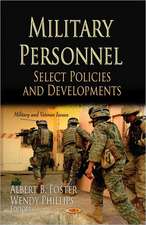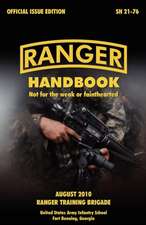Private Military and Security Companies and States: Force Divided: New Security Challenges
Autor Christopher Spearinen Limba Engleză Paperback – 3 aug 2018
| Toate formatele și edițiile | Preț | Express |
|---|---|---|
| Paperback (1) | 735.35 lei 38-44 zile | |
| Springer International Publishing – 3 aug 2018 | 735.35 lei 38-44 zile | |
| Hardback (1) | 763.32 lei 3-5 săpt. | +20.16 lei 4-10 zile |
| Springer International Publishing – 14 aug 2017 | 763.32 lei 3-5 săpt. | +20.16 lei 4-10 zile |
Din seria New Security Challenges
- 9%
 Preț: 763.32 lei
Preț: 763.32 lei -
 Preț: 390.63 lei
Preț: 390.63 lei - 15%
 Preț: 636.94 lei
Preț: 636.94 lei - 15%
 Preț: 580.68 lei
Preț: 580.68 lei -
 Preț: 381.59 lei
Preț: 381.59 lei - 15%
 Preț: 644.95 lei
Preț: 644.95 lei -
 Preț: 386.61 lei
Preț: 386.61 lei -
 Preț: 391.61 lei
Preț: 391.61 lei -
 Preț: 385.84 lei
Preț: 385.84 lei -
 Preț: 389.88 lei
Preț: 389.88 lei -
 Preț: 428.07 lei
Preț: 428.07 lei - 15%
 Preț: 649.06 lei
Preț: 649.06 lei -
 Preț: 383.93 lei
Preț: 383.93 lei -
 Preț: 390.63 lei
Preț: 390.63 lei -
 Preț: 388.13 lei
Preț: 388.13 lei -
 Preț: 382.18 lei
Preț: 382.18 lei -
 Preț: 392.60 lei
Preț: 392.60 lei -
 Preț: 388.72 lei
Preț: 388.72 lei -
 Preț: 387.38 lei
Preț: 387.38 lei - 15%
 Preț: 695.70 lei
Preț: 695.70 lei - 15%
 Preț: 584.43 lei
Preț: 584.43 lei -
 Preț: 383.93 lei
Preț: 383.93 lei -
 Preț: 384.86 lei
Preț: 384.86 lei -
 Preț: 388.52 lei
Preț: 388.52 lei - 15%
 Preț: 699.77 lei
Preț: 699.77 lei - 18%
 Preț: 726.37 lei
Preț: 726.37 lei -
 Preț: 384.09 lei
Preț: 384.09 lei -
 Preț: 388.13 lei
Preț: 388.13 lei -
 Preț: 385.47 lei
Preț: 385.47 lei - 15%
 Preț: 640.88 lei
Preț: 640.88 lei -
 Preț: 385.84 lei
Preț: 385.84 lei -
 Preț: 383.93 lei
Preț: 383.93 lei -
 Preț: 382.75 lei
Preț: 382.75 lei -
 Preț: 389.70 lei
Preț: 389.70 lei - 15%
 Preț: 697.97 lei
Preț: 697.97 lei -
 Preț: 382.95 lei
Preț: 382.95 lei -
 Preț: 387.38 lei
Preț: 387.38 lei
Preț: 735.35 lei
Preț vechi: 808.07 lei
-9% Nou
Puncte Express: 1103
Preț estimativ în valută:
140.71€ • 147.31$ • 116.43£
140.71€ • 147.31$ • 116.43£
Carte tipărită la comandă
Livrare economică 03-09 aprilie
Preluare comenzi: 021 569.72.76
Specificații
ISBN-13: 9783319855158
ISBN-10: 3319855158
Pagini: 229
Ilustrații: XII, 229 p.
Dimensiuni: 148 x 210 mm
Ediția:Softcover reprint of the original 1st ed. 2017
Editura: Springer International Publishing
Colecția Palgrave Macmillan
Seria New Security Challenges
Locul publicării:Cham, Switzerland
ISBN-10: 3319855158
Pagini: 229
Ilustrații: XII, 229 p.
Dimensiuni: 148 x 210 mm
Ediția:Softcover reprint of the original 1st ed. 2017
Editura: Springer International Publishing
Colecția Palgrave Macmillan
Seria New Security Challenges
Locul publicării:Cham, Switzerland
Cuprins
Chapter 1: Introduction.- Chapter 2: Conventional Forces Norm.- Chapter 3: The Histroy of commercial non-state violent actors.- Chapter 4: Land Power and PMSCs.- Chapter 5: Sea Power and PMSCs.- Chapter 6: Air Power and PMSCs.- Chapter 7: Conclusion.
Notă biografică
Christopher Spearin is Associate Professor of Defence Studies at the Royal Military College of Canada/Canadian Forces College.
Textul de pe ultima copertă
“In this timely and thought-provoking work, Christopher Spearin provides important new insight into the normative, technological and strategic factors that help shape the use of private military and security companies on land, at sea and in the air. The analysis increases our understanding of these commercial actors and the ways in which their past, present and future remains intimately linked to states and the organisation, control, and deployment of military force. This is a significant addition to research in this field and will appeal to students, scholars and policy makers alike.”
– Joakim Berndtsson, Associate Professor, University of Gothenburg, Sweden
This book identifies and explains the functional and ideational boundaries regarding what states and Private Military and Security Companies (PMSCs) both do and possess regarding land power, sea power, and air power. Whereas the mercenaries, privateers, and chartered companies of years past heldsimilar characteristics to state military forces, the PMSCs of today are dissimilar for two reasons: a conventional forces norm amongst states and a state proclivity towards the offensive. These factors reveal both the limitations of and the possibilities for contemporary security privatization. This volume is ideal for civilian and military practitioners and students wishing to develop a detailed understanding of what the private military and security industry has to offer and why it is structured the way it is.
– Joakim Berndtsson, Associate Professor, University of Gothenburg, Sweden
This book identifies and explains the functional and ideational boundaries regarding what states and Private Military and Security Companies (PMSCs) both do and possess regarding land power, sea power, and air power. Whereas the mercenaries, privateers, and chartered companies of years past heldsimilar characteristics to state military forces, the PMSCs of today are dissimilar for two reasons: a conventional forces norm amongst states and a state proclivity towards the offensive. These factors reveal both the limitations of and the possibilities for contemporary security privatization. This volume is ideal for civilian and military practitioners and students wishing to develop a detailed understanding of what the private military and security industry has to offer and why it is structured the way it is.
Caracteristici
Offers the first comprehensive treatment of PMSC presence in the land, sea, and air settings Provides an interdisciplinary approach employing international relations theory, sociology, security studies, and state military concepts and history Argues that PMSCs are framed to offer services that are reliant on human labour rather than on sophisticated technologies
